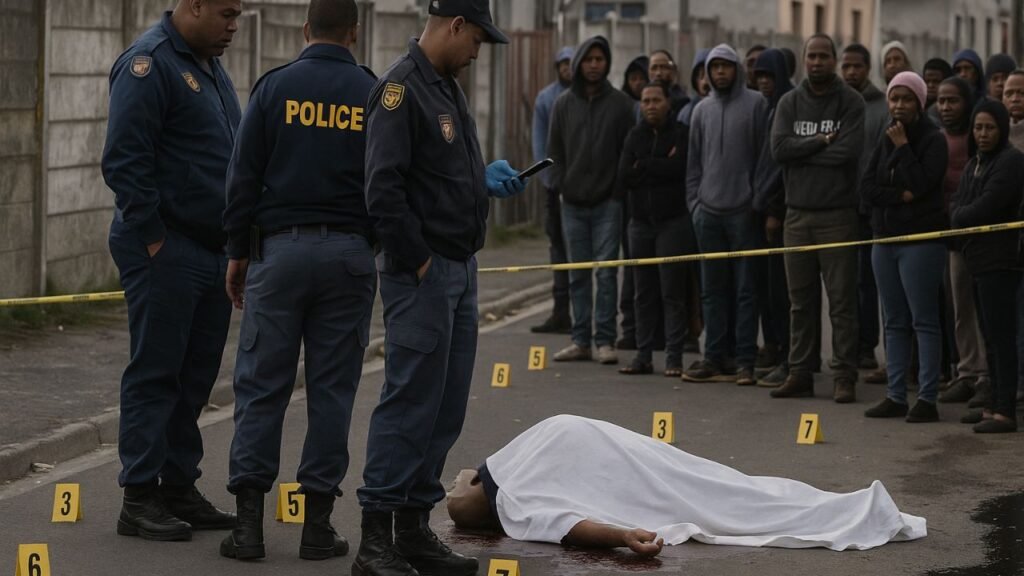Cape Town Faces Bloodshed – Cape Town has once again found itself at the center of a violent storm, with six lives claimed in just 48 hours due to escalating gang warfare in Western Cape settlements. The tragedy unfolded across areas such as Manenberg, Hanover Park, and Delft, known hotspots for territorial gang conflict. Victims included both alleged gang members and innocent bystanders, igniting community outrage and national concern. With the South African Police Service (SAPS) stretched thin and struggling to contain the violence, residents have taken to social media and radio stations to call for emergency military deployment and long-term intervention. The increase in gun-related deaths in recent months is not isolated, with Western Cape consistently ranking high in national crime statistics. While Cape Town remains one of South Africa’s most iconic tourist destinations, the dark undercurrent of gang control continues to challenge safety, governance, and social progress. According to a recent report by the Institute for Security Studies, gangs thrive due to poor policing, economic desperation, and ineffective rehabilitation programs.

Why the Western Cape Continues to Be a Flashpoint for Gang Violence
The Western Cape, particularly the Cape Flats region, has long been plagued by gang-related issues rooted in apartheid-era spatial planning, poverty, and unemployment. Gang violence in this region is often perpetuated by competition over drug trade, extortion rackets, and recruitment of disenfranchised youth. According to a 2023 police report by SAPS, nearly one in four murders in the Western Cape is gang-related. These gangs operate as highly organized units, often outmatching local police in both weaponry and intelligence. Residents report a growing fear of simply walking to school or grocery stores, especially during peak turf war periods. Despite various attempts by the government, such as Operation Shanela and anti-gang task forces, the structural drivers of violence remain largely unaddressed. Community organizations and religious leaders have stepped into the gap, offering counseling, youth development programs, and neighborhood watches, but without significant policy reform and resource allocation, their efforts remain limited in scale and reach.
Police Struggle to Contain Turf Wars as Calls for SANDF Deployment Grow
In the wake of these recent killings, pressure is mounting on the South African government to deploy the South African National Defence Force (SANDF) to stabilize hotspots. While SAPS claims that intelligence-driven operations have led to multiple arrests, local activists argue that arrests are often reactionary rather than preventive. The Anti-Gang Unit, launched with much fanfare in previous years, is reportedly underfunded and poorly staffed. Political leaders in the Western Cape, including Premier Alan Winde, have repeatedly requested national intervention and broader autonomy in policing powers. Critics argue that long-term solutions require investment in education, rehabilitation, and employment rather than just militarized crackdowns. According to News24 reports, community-policing forums are struggling to maintain cooperation between citizens and law enforcement, further worsening trust and information flow.
Impact on Daily Life and Youth in Gang-Controlled Communities
For families in gang-controlled communities, everyday life is dictated by fear. School attendance drops significantly during gang flare-ups, as parents keep their children home to avoid stray bullets or forced recruitment. Several NGOs, such as the Amy Foundation, have reported a spike in calls for help from at-risk youth, many of whom are caught between hunger and loyalty to gangs who offer quick money. Teachers and principals in Manenberg and Bonteheuwel say learning has become almost impossible, with frequent lockdowns and trauma among students. Beyond the obvious physical dangers, the psychological toll on young people is enormous, contributing to generational cycles of violence. In the absence of robust public programs, many youth turn to gangs as a means of identity, protection, and survival. If no intervention comes, experts warn that the region could soon become a war zone where civil authority is almost entirely eroded.
Solutions Proposed by Experts and Civil Society for Long-Term Change
Experts suggest that any real solution must include both short-term suppression and long-term structural reform. This includes revamping the country’s criminal justice system, boosting mental health services, and offering economic alternatives to gang membership. Civil society groups urge the government to channel more funding into early childhood education, youth employment incentives, and urban redevelopment of dilapidated neighborhoods. Programs that engage ex-gang members as mentors are also showing promise, according to a study by the Global Initiative Against Transnational Organized Crime, which highlights success stories from Cape Town and Johannesburg. On the political front, activists want greater accountability from both local and national leaders, including transparent crime data reporting and community policing budget disclosures. Without these reforms, Cape Town’s gang crisis is likely to intensify, threatening not only the lives of its residents but also the democratic foundations of South Africa itself.







